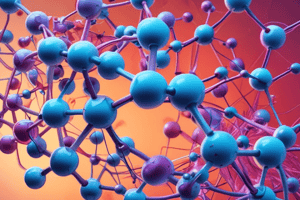Podcast
Questions and Answers
What is organic chemistry?
What is organic chemistry?
Organic chemistry is a branch of science that deals with carbon compounds.
How does carbon stand out among elements?
How does carbon stand out among elements?
Carbon stands out due to its ability to bond through four electrons and create extended networks of covalent bonds.
What are some key aspects of organic chemistry?
What are some key aspects of organic chemistry?
Some key aspects involve studying unique molecular configurations, their reactivity differences, and their influence on chemical behavior.
What is the foundation of organic chemistry?
What is the foundation of organic chemistry?
What are the building blocks in organic chemistry?
What are the building blocks in organic chemistry?
What kind of bonds can form in organic chemistry?
What kind of bonds can form in organic chemistry?
What are some factors that can influence the outcome of organic reactions?
What are some factors that can influence the outcome of organic reactions?
Describe the concept of biomimicry in organic chemistry.
Describe the concept of biomimicry in organic chemistry.
What are some common pathways studied in organic chemistry related to reactions?
What are some common pathways studied in organic chemistry related to reactions?
How do modern organic synthesizers contribute to sustainability?
How do modern organic synthesizers contribute to sustainability?
What is the main goal of understanding reactivity patterns and mechanisms in organic chemistry?
What is the main goal of understanding reactivity patterns and mechanisms in organic chemistry?
How does organic chemistry impact various fields beyond pharmaceuticals?
How does organic chemistry impact various fields beyond pharmaceuticals?
Study Notes
Exploring Organic Chemistry's Colorful World
Organic chemistry is a branch of science that deals with carbon compounds—materials built around atoms that form intricate chains, rings, and complex structures. This field has revolutionized our understanding of life itself as it encompasses the study of molecules found within living organisms, from simple sugars and fats to the vast array of proteins and nucleotides essential to cells.
Carbon's Unique Properties
Carbon stands out among elements due to its ability to bond through four electrons and create extended networks of covalent bonds. These properties enable carbon to create diverse, three-dimensional molecular shapes known as stereochemistry. Some key aspects of organic chemistry involve studying these unique configurations, their reactivity differences, and their subsequent influence on chemical behavior.
Building Molecular Structures
The foundation of organic chemistry lies in the formation of covalent bonds between carbon and hydrogen, oxygen, nitrogen, halogens, sulfur, phosphorus, silicon, and other metals like boron and aluminum. These building blocks combine via single-, double-, triple-, and aromatic bonds, resulting in an almost endless variety of potential structures. In turn, these molecular architectures present varying levels of stability, solubility, reactivities, and biological activities, making them central subjects of research across numerous fields ranging from pharmaceuticals to materials science.
Reactivity Patterns and Mechanisms
Organic chemists investigate the processes by which molecules undergo transformations, often referred to as reactions. Numerous reaction types exist, each characterized by specific patterns and mechanisms. Reactions can vary depending upon factors such as temperature, pressure, catalyst presence, or solvent polarity, leading researchers to explore the full range of conditions that enhance desired outcomes while minimizing side products. For instance, electrophilic substitution, nucleophilic substitution, reduction, oxidation, and elimination reactions represent some common pathways studied in this area of chemistry.
Biomimetic Approaches and Synthetic Methodology
Biomimicry, the process where chemists design synthetic methods inspired by natural systems, plays an essential role in developing new drug candidates, bioactive agents, and green chemistry solutions. This approach often involves unraveling the mechanisms behind biosynthesis and optimizing methods to produce similar results with minimal waste generation and energy consumption. To achieve this goal, modern organic synthesizers develop innovative techniques centered on cleaner strategies and more efficient protocols to improve sustainability in both academia and industry.
In summary, organic chemistry offers a fertile ground for creativity and discovery, allowing us to understand nature's complexity and develop practical applications benefiting humanity. As we continue striving to elucidate the fundamental principles governing these fascinating molecules, our interactions with biology, medicine, environmental sciences, material science, and even resource management will undoubtedly grow deeper and more impactful.
Studying That Suits You
Use AI to generate personalized quizzes and flashcards to suit your learning preferences.
Description
Dive into the colorful world of organic chemistry, where carbon compounds come to life in intricate structures and reactions. Explore the uniqueness of carbon's bonding properties, the diversity of molecular structures, reactivity patterns, biomimetic approaches, and their applications in various fields.




